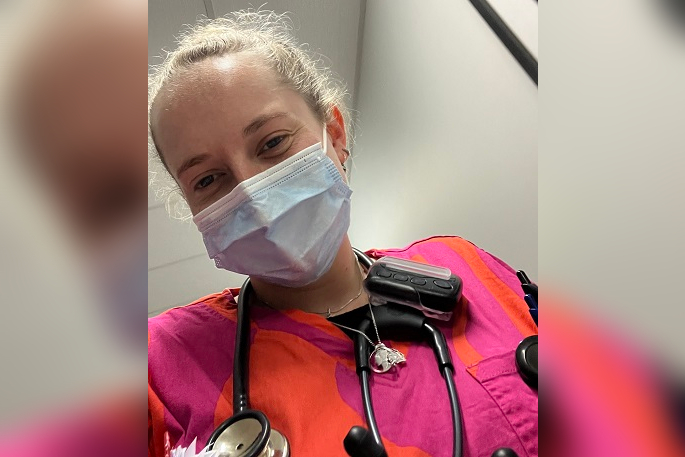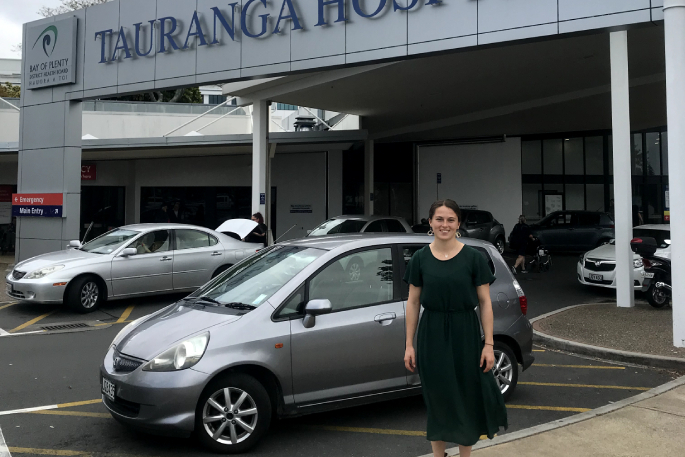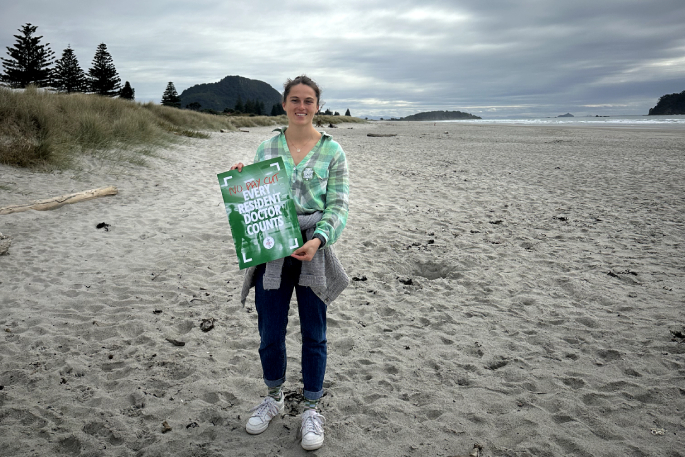Two young doctors from Whakatāne and Tauranga Hospitals shared their thoughts as they joined their colleagues on Tuesday in a strike for fair pay and improved working conditions.
Dr Rose Gannaway from Whakatāne and Dr Jess Polo from Tauranga represent around 2500 Resident Medical Officers unhappy with the employer’s position in bargaining by going on strike for 25 hours.
“It’s not an easy decision to move to strike action,” says Rose.
As a postgraduate second-year doctor, having completed eight years of study, she is still new to her working career.
She says collective bargaining between Health New Zealand Te Whatu Ora and the Resident Doctors Association reached a point where Te Whatu Ora provided a pay offer, giving some resident doctors a pay rise, but other doctors would receive a significant pay cut.
“It’s completely unacceptable. In the pay cut would be registrars in about 600 positions within specialties such as psychiatry, public health, radiation, oncology, general practice, which are all the crux of our primary health, mental health, and oncology services.
“It really just doesn’t make sense to any of us what Te Whatu Ora has offered.”
The strike involves around 20 Whakatāne staff and 150 in Tauranga. Jess, an RMO at Tauranga Hospital, is in her fourth year out of medical school, and says it’s about the working conditions too, not just the pay rate.
“We are wanting to phase out working two long days in a row that some RMOs are required to work over weekends,” says Jess.
She has on average one long day a week where she works from 8am-10pm, then back at work the next day for an 8am start.
“This may be amongst a 10-day stretch with one to two long days in total.”
“Lots of my colleagues are being declined any annual leave due to staff shortages and not having cover.”
Joyless life for doctors and patients
“We already know how difficult it is for people to get into a GP here in the Bay of Plenty or any other place in New Zealand,” says Rose.
 Dr Rose Gannaway at Whakatane Hospital. Photo: Supplied.
Dr Rose Gannaway at Whakatane Hospital. Photo: Supplied.
“This offer from Te Whatu Ora is a massive deterrent to enter or continue GP training. It’s giving doctors a reason to look to Australia, at different job prospects, or find something that is going to give them better working hours and pay.”
To complicate things, there are two unions doctors can be members of.
“Yes, I would get a pay rise, but it’s less than what a colleague in another union has been offered, to work exactly the same hours. So there’s serious disparities and that’s just not acceptable,” says Rose.
Personal time is a rarity
Rose says long hours of work means little time spent at home and no energy to socialise. Her dog Sandy is a key part of her life.
“My partner and I rescued her last February just after I started work as a doctor. When we’re not at work we’re always at Ohope Beach or harbour together.”
 Dr Rose Gannaway with her dog Sandy at Ohope Beach. Photo: Supplied
Dr Rose Gannaway with her dog Sandy at Ohope Beach. Photo: Supplied
Personal time is also a rarity for Jess.
As well as working 55+ hours a week, she is completing a postgraduate diploma in obstetrics and gynaecology this year.
“The lectures and assignments take up a lot of my personal time,” says Jess.
“I took the year off last year to complete a full immersion te reo Māori language course, and I am continuing my learning this year with the level 5 course Te Rōnakitanga at Te Whare Wānanga o Aotearoa on a Wednesday night and one weekend a month.”
Jess enjoys CrossFit, prioritising this to keep herself mentally and physically well.
“I had to make the hard decision not to play hockey this year as I just don’t have the time.”
 Dr Jess Polo at Tauranga Hospital. Photo: Supplied.
Dr Jess Polo at Tauranga Hospital. Photo: Supplied.
She says the inability to have a break is contributing to workers leaving the industry altogether or going overseas.
“Most people I’ve known from med school, will work for two or three years and take almost six to 12 months off because they need a mental break. Others have gone to Australia. So, it’s not building a strong workforce here in New Zealand.”
Ensuring patient safety
After her eight-year stint at university, Rose finds she loves working at Whakatāne Hospital.
“I love all of the groups of people I work with; it’s the community here that I get to serve and advocate for on a daily basis. That does bring me complete joy and it is a real honour.”
She finds though that she finishes most days contemplating why she’s working such long hours.
“I know those thoughts are only there because I’m overworked, I’m exhausted, and I know I’ve got eight more days of my 10-day stretch to come. And it’s hard. Patient safety always does come first. To deliver safe care, you need the doctors to be safe as well.”
More than just pay
Rose says although the strike seems to be all about pay, it’s also about work/life balance and wellbeing for doctors.
“This has been going on for years. It’s almost like it is accepted that we work those hours."
While they didn’t picket in Whakatāne on Tuesday, Rose says this could change with another two-day strike for next week being announced.
“We are planning to get out and do some volunteer work in our community here, given it’s over a two-day period.”
Te Whatu Ora responds
Te Whatu Ora says hospitals across the country will stay open and continue to provide care and support to patients while the junior doctors’ strike is ongoing.
“As part of our contingency planning decisions have been made locally on staffing and the delivery of services, to reflect local circumstances,” says Health New Zealand chief clinical officer Dr Richard Sullivan.
“Senior medical officers, and some juniors from the non-striking union are onsite across our hospitals, supported by our nursing and allied health teams, and our community-based teams to ensure the ongoing delivery of safe care to patients and enabling discharge home.”
Richard says the impact of the strike on planned procedures has varied by hospital, depending on the number of NZRDA members employed in each area.
“In areas with a higher number of NZRDA members, a small number of surgeries and procedures have gone ahead [on Tuesday] for high-risk cases, and non-deferrable and other scheduled cases have been postponed and will be rescheduled.
“In other areas with lower NZRDA membership, there have been less disruptions, and more procedures were able to proceed. However, this remains limited by the overall staff availability.”
Emergency departments remained open during the strike and doctors were still available to provide life-preserving services, patient assessment and treatment and clinical advice. Additional community back-up has been provided in some areas too.
“Junior doctors are a vital and valued part of the health workforce, and we are proposing a very significant investment in settling the NZRDA collective agreement,” says Richard.
The average pay rise proposed is 18 per cent, he says.
“The pay structure is complex and how and when pay increases depends on individual circumstances. We have been, and remain, open to different ways of packaging these pay rises. “We have guaranteed that no current RMO would receive a pay cut under this offer.”
Richard says they are highly focused on settling this bargaining so they can avoid any further disruption to patients and the wider health system.
“We are pleased our application for facilitation has been granted by the Employment Relations Authority. We encourage the union to accept the authority’s recommendation that the union withdraws its current strike notices as an act of good faith due to the facilitation process.”
Where to from here
If the two sides can not reach agreement by next week a second, two-day strike is planned from May 16.
People should call 111 or go to the nearest emergency department immediately if they or someone else has a medical emergency or a serious or life-threatening condition.
People with non-urgent ailments or injuries should contact their GP in the first instance. Anyone unsure about whether they should go to ED should contact their GP or call Healthline (0800 611 116) for free advice.



1 comment
An excellent article...
Posted on 10-05-2024 15:08 | By morepork
... which gives true insight into the way our valuable medical staff are treated. Specialists in industry (I was one) get treated FAR better than this and you can't blame medical staff for being upset. Requiring young Doctors to work 14 hour days is inadvisable, unfair, error-prone, and unreasonable. OK, NZ provided and subsidized their training so you could argue they have an obligation to return on the investment, but that doesn't mean they should have the life sucked out of them like some vampire victim. It is no wonder our Health Service is in the state it is. There needs to be a review of the whole way we run it, with proper, civilized hours (and decent working wages) for ALL medical staff. We won't be attracting people to the profession if they have to go on strike to be recognized.
Leave a Comment
You must be logged in to make a comment.